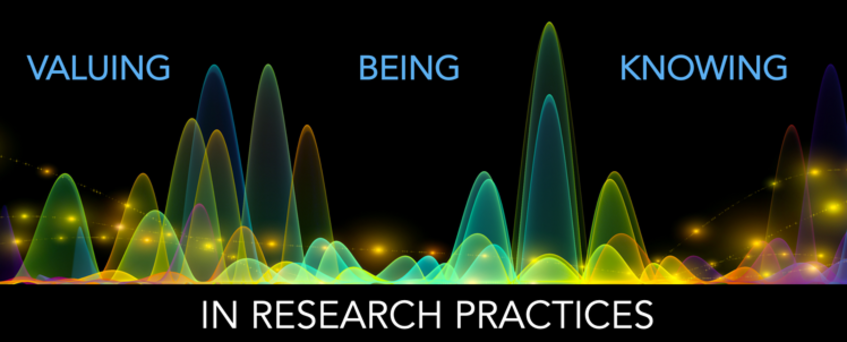Duration 01.2019 – 02.2024
Valuing, Being, Knowing. Understanding the entanglements of valuation practices and subjectification processes in life science research
Project Description

Project Description
Is there a connection between the (e)valuation of research, the development of researchers’ identities and the directions they take in seeking knowledge?
Previous research has given many hints to answering this question: It has been shown for example that researchers’ motivations and what they value in their work changes along their career paths. Studies also suggest that how researchers see themselves (e.g. rather as competitive individuals or as part of a research collective) has implications for how they take strategic decisions in their research. Particularly with regard to regimes that aim to assess, monitor and improve the efficiency of research practices - such as New Public Management - and with the increase of temporal employment, researchers learn to manoeuvre more competitively. But how does this change the way they think about themselves, and how they do their science?
These regimes of research governance – and the effects they create – may shift researchers’ focus away from societal values and questions of academic citizenship. In the life sciences, as in other research fields, many researchers have started to doubt the meaningfulness of churning out as many papers as possible to prepare for the next job application or evaluation: They question whether this will help them achieve the kind of knowledge they strive for and be the kind of researcher they want to be. This can lead researchers to reflect and question their identity, but also prompt them to carve out time to re-orient their work and lives in research.
However, we still know surprisingly little about the detailed processes in which valuing, being and knowing are entangled in research. Current scientific and policy debates about how to foster societal relevance in research, how evaluation indicators might be changing academic knowledge production and corresponding calls for developing alternative ways for (e)valuating research, as well as debates about changing career structures give these questions a sense of imminent relevance.
Approach
- We accompany three life science research groups and their members for more than two years. The three groups follow research trajectories related to plant breeding and plant-soil-microbiome interaction and are thus of societal relevance for issues of climate change and food security.
- We use different methods of qualitative social science research (interviews, group discussions, observations, document analysis) to trace the situated entanglements of what researchers aim to know, what they value in their research and who they aim to be as researchers.
- We follow a participatory research approach, meaning that we do not just observe how research trajectories develop over time, but continually reflect on our findings with research participants.
- We combine three analytical perspectives: Valuation, Subjectification and Temporality
Collaboration Partners
Univ.-Prof. Hermann Bürstmayr & Colleagues
Institute of Plant Breeding, Institute of Biotechnology in Plant Production; BOKU/IFA Tulln
Dr. Eva Oburger & Colleagues
Institute of Soil Research; BOKU Tulln
Asst.-Prof. Dagmar Woebken & Colleagues
Division of Microbial Ecology; University of Vienna
Relevant Publications
Felt, U., Fochler, M., Richter, A., Schroeder, R., & Sigl, L. (2018). How to weave societal responsibility into the fabric of universities. Times Higher Education. (A longer version of this text is available at the Reflections-Blog: https://blog.sts.univie.ac.at/2018/09/06/how-to-weave-societal-responsibility-into-the-fabric-of-universities/.)
Felt, U. (2017). Under the shadow of time: Where indicators and academic values meet. Engaging Science, Technology, and Society, 3, 53-63.
Fochler, M., & Sigl, L. (2018). Anticipatory Uncertainty: How Academic and Industry Researchers in the Life Sciences Experience and Manage the Uncertainties of the Research Process Differently. Science as Culture, 27(3), 349-374. doi:10.1080/09505431.2018.1485640.
Fochler, M., & de Rijcke, S. (2017). Implicated in the Indicator Game? An Experimental Debate. Engaging Science, Technology, and Society, 3, 21-40. doi:DOI:10.17351/ests2017.108
Fochler, M., Felt, U., & Müller, R. (2016). Unsustainable Growth, Hyper-Competition, and Worth in Life Science Research: Narrowing Evaluative Repertoires in Doctoral and Postdoctoral Scientists’ Work and Lives. Minerva, 54(2), 175-200. doi:DOI 10.1007/s11024-016-9292-y.
Fochler, M. (2016). Variants of Epistemic Capitalism: Knowledge Production and the Accumulation of Worth in Commercial Biotechnology and the Academic Life Sciences. Science, Technology & Human Values, 41(5), 922-948. doi:10.1177/0162243916652224.
Franssen, T., Hessels, L. K., Scholten, W., & de Rijcke, S. (2018). The Drawbacks of Project Funding for Epistemic Innovation: Comparing Institutional Affordances and Constraints of Different Types of Research Funding. Minerva, 56(1), 11-33.
Gill, R. (2014). Academics, Cultural Workers and Critical Labour Studies. Journal of Cultural Economy, 7(1), 12-30.
Hicks, D., Wouters, P., de Rijcke, S., & Rafols, I. (2015). The Leiden Manifesto for research metrics. Nature, 520, 429-431.
Müller, R., & de Rijcke, S. (2017). Exploring the epistemic impacts of academic performance indicators in the life sciences. Research Evaluation, 26(3), 157-168.
Sigl, L. (2019). Subjectivity, governance, and changing conditions of knowledge production in the life sciences. Subjectivity, 12 (2), 117-136.
Sigl, L. & Fochler, M. (2019). Gemeinsam oder einsam? Über den Umgang mit Unsicherheiten in Biotech und akademischer Forschung. Laborjournal, 7-8, 40-43.
Sigl, L. (2016). On the Tacit Governance of Research by Uncertainty: How Early Stage Researchers Contribute to the Governance of Life Science Research. Science, Technology, & Human Values, 41(3), 347-374. doi:DOI: 10.1177/0162243915599069.
Wilsdon, J., Allen, L., Eleonora Belfiore, Campbell, P., Curry, S., Hill, S., . . . Johnson, B. (2015). The Metric Tide: Report of the Independent Review of the Role of Metrics in Research Assessment and Management. . doi:DOI: 10.13140/RG.2.1.4929.1363
